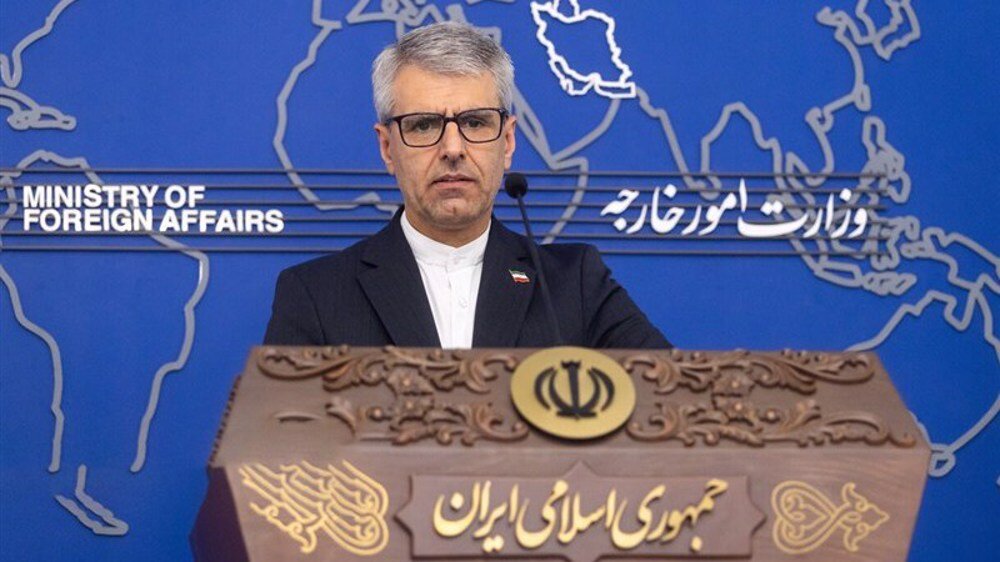Efforts to activate ‘snapback’ are illegal and illogical: Iran foreign ministry

TEHRAN – Iran’s Foreign Ministry has rejected European efforts to activate the JCPOA snapback mechanism, calling the move both illegal and illogical.
Speaking in the weekly press conference on Monday, the Spokesperson for the Iranian Foreign Ministry Esmaeil Baghaei emphasized that the three European countries involved failed to meet their obligations under the nuclear deal and warned that such actions represent a non-constructive approach serving Israeli interests rather than promoting dialogue on Iran’s nuclear program.
The snapback mechanism, a provision within the 2015 Joint Comprehensive Plan of Action (JCPOA), allows for the swift reinstatement of UN sanctions if Iran is deemed “non-compliant” with the nuclear deal.
Tehran considers this mechanism illegal, particularly after the 12-Day War in June, during which the UK, France, and Germany (the E3) aligned with the Israeli regime and the U.S. in their targeting of Iran’s nuclear, military, and civilian sites.
Iran challenged the legal validity of the UN Security Council’s snapback mechanism for reinstating sanctions and declaring the 2015 nuclear deal effectively defunct.
Regarding ongoing negotiations with European countries, he added: “Talks continue, but no date has been set for further discussions.”
Iran denies rumors of foreign embassy closures in Tehran
Baghaei dismissed reports that foreign embassies in Tehran were closing, stating: “None of the embassies reported as closed are actually closed.”
He clarified that while some consular activities were reduced following the war, all embassies remain fully operational.
‘Attacks on civilian infrastructure in Palestine, Yemen constitute war crimes’
Baghaei condemned ongoing violence in the region: “The genocide in Palestine continues, and Gazans still face hunger. The international community has spoken against the forced displacement of Gaza’s population, yet the Zionist regime, backed by the U.S., continues its crimes. Last Saturday, this regime also targeted civilian areas in Yemen, which we strongly condemn. Attacks on civilian infrastructure constitute war crimes.”
The Palestinian Ministry of Health in Gaza said on Monday the overall death toll since October 7, 2023 has risen to 62,004, with 156,230 people wounded. Since March 18, 2025, when Israel broke the most recent ceasefire, at least 10,460 have been killed and 44,189 injured.
Commenting on the Abraham Accords, Baghaei warned: “The expansionist ambitions of the Zionist regime are clearer than ever. Netanyahu’s plan for a ‘Greater Israel’ shows a regime with no limits. Its genocidal designs and threats toward Lebanon, Syria, and Saudi Arabia endanger regional security. If neighboring countries are not vigilant, they will face endless wars.”
Regarding European recognition of Palestine, he warned: “Recognition should not be a form of deception. European countries must uphold commitments seriously. True recognition requires establishing a government in Palestine through a referendum including all residents—Muslims, Christians, and Jews.”
‘Foreign intervention is not tolerated by Iran’
On the South Caucasus, Baghaei stressed Iran’s sensitivity to foreign intervention. “We have explicitly conveyed concerns about the presence and meddling of extraregional actors. Any partnerships with the U.S. will operate within Armenian jurisdiction, respecting national sovereignty and borders. Unblocking and creating communication routes—including the railway linking Azerbaijan to Nakhchivan via southern Armenia—must not infringe on international borders or Armenia’s sovereignty.” He added: “We are closely monitoring developments and will convey concerns to regional countries when necessary.”
Addressing NATO forces entering via the Ararat border, Baghaei stated: “Extraregional military presence—including U.S. and NATO forces—destabilizes the region. Iran monitors developments closely and will safeguard its borders.”
‘Iran’s relations with IAEA will continue’
Baghaei clarified Iran’s ongoing cooperation with the International Atomic Energy Agency (IAEA): “Relations with the IAEA continue. The agency’s deputy visited Tehran last week to discuss a new cooperation protocol. Our representative in Vienna maintains direct contact.”
Deputy Foreign Minister Kazem Gharibabadi announced last week that Iran and the International Atomic Energy Agency have agreed to continue consultations following talks in Tehran, marking a potential thaw in relations after cooperation was suspended in June.
The breakthrough follows Tehran’s call for a fundamental restructuring of its engagement with the UN nuclear watchdog, citing the IAEA’s failure to fulfill its responsibilities during U.S.-Israeli attacks on civilian nuclear sites in June.
IAEA Deputy Director General Massimo Aparo led the international body’s delegation, and although inspections did not take place, both sides agreed to advance technical discussions. “Taking into account the discussions held during the meeting, it was decided to continue consultations,” Gharibabadi said, stressing that future cooperation will depend on meaningful IAEA reforms.
During the latest meeting, the Iranian delegation strongly criticized the IAEA’s silence in response to recent attacks—carried out with U.S. support and involvement—against nuclear facilities in Fordo, Isfahan, and Natanz.
The talks follow Iran’s June 25 parliamentary vote, which unanimously approved a law suspending IAEA cooperation. The legislation mandates that any future inspections require explicit approval from Iran’s Supreme National Security Council and guarantees for the physical and technical security of nuclear facilities.
Parliament Speaker Mohammad Baqer Qalibaf has condemned the IAEA for becoming a "political tool" after it accused Iran of non-proliferation violations days before the Israeli regime’s attacks—a move Tehran believes provided pretext for the aggression.
